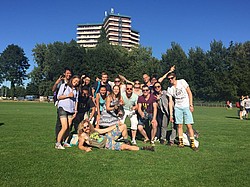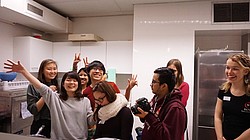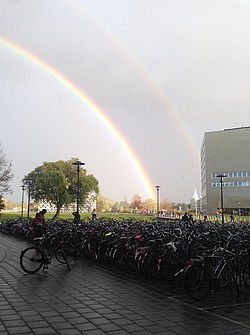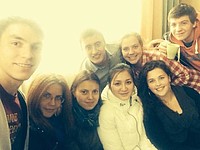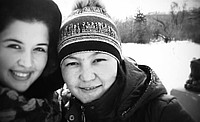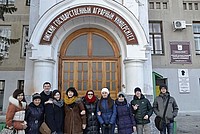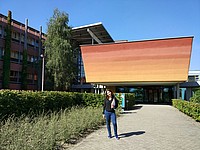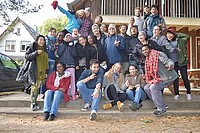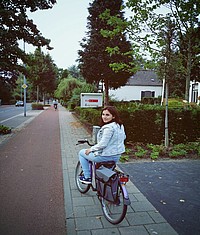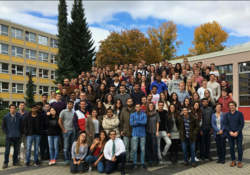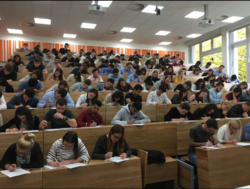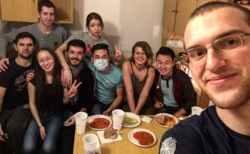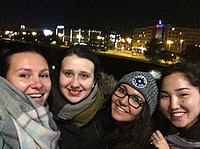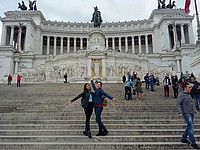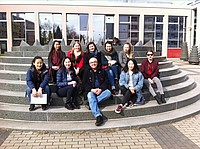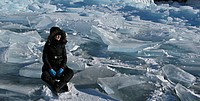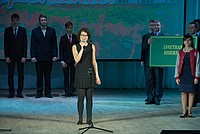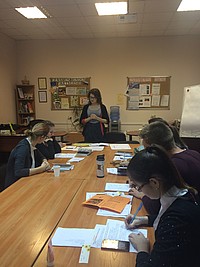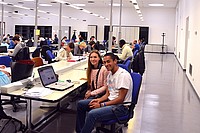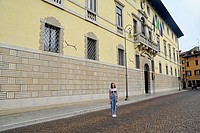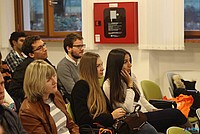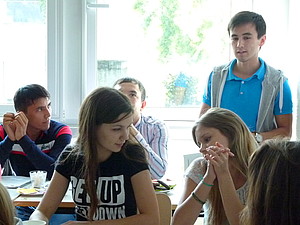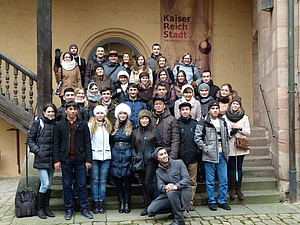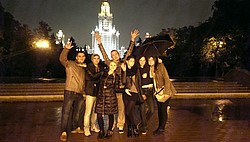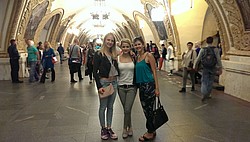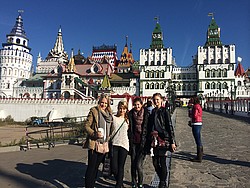Bachelor stories
Bachelor, 6 months - WS 2016-2017 at Wageningen University
The opportunity to study in Europe was always a great chance to get new knowledge and to look at a university life from a different perspective. Therefore, I could not miss a chance to take part in IAMONET-RU mobility program. I applied for the grant within Target group 3 since I belonged to an indigenous population. And a whole acceptance process was quite challenging and took a long time. But the result was worth all the effort. Wageningen University in the Netherlands was my first priority.
The next step was to get accepted into the university itself, which was a lot more difficult than I expected. My major was architecture and urban planning and I had to change course preferences many times since my background knowledge did not correspond to European ones or was not enough. However, we found a way to sign a learning agreement.
Most of the courses were related to environmental sciences - Environmental management and Industry, Introduction to leisure, tourism and environment and others are more from planning - Planning theory and ethics, Planning for urban quality of life and Introduction to GIS. 6 ECTS credits each, 30 ECTS credits in total. I must say that I really enjoyed these subjects. Even though, they were not all about urban planning and architecture, I had a chance to perceive how all these are important and interconnected with each other. I would never have a chance like this to gain all the possible knowledge I can if there were not these multidisciplinary courses.
Dutch education system completely differs from the Russian system. In Wageningen University we studied 2 courses per period which takes around 2 months. This system was very convenient for me. At the end of each period there are only two exams which you can pass without any pressure and stress from other courses. But the 3rd period consisted only of one full day course. As for me, I think this way of studying gives you more time and power to immerse into subjects.
Moreover, I found classes at Wageningen University very interactive and fruitful in discussions and opinions. Local and other foreign students were absolutely inspiring for me. They all were strongly motivated and active during school time and I have never experienced such a close communication between professors and students.
Student's life here was quite lively - from quiet cultural events to loud drinking Thursdays. At the very beginning, we enjoyed AID (Annual Introduction Days),after that, we could split up and join any other variety of students' organizations and circles. And as a tradition, I joined International Students' Organization of Wageningen. One more exciting thing is cycling - the nicest way of transportation within this small town and even between the cities. There is a feeling that Dutch lifestyle is super active and productive.
All 6 months experience is full of amazing memories that I will neither forget nor regret. I would like to thank IAMONET-RU mobility program for giving us this chance to experience this students' life in the Netherlands. I am sure that the knowledge that we gained here is going to help our academic future and career.
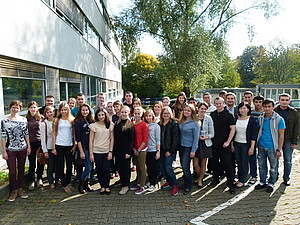
Bachelor, 6 months - WS 2014-2015 at the University of Hohenheim
I was enrolled to the Faculty of Economics and Business Administration. Mainly, the subjects I chose belonged to such fields as Micro- and Macroeconomics, with the only exception - Advanced Negotiation Management. The exams that I passed: Microeconomics, Quantitative Methods in Economics, Interest and Prices, Interorganizational Negotiations. Additionally, I took German (B1.1) and French (B1.1) courses, successfully passed exams and got certificates. All the lectures and tutorials were particularly well structured, very comprehensive and intuitive. Despite the fact that I chose them from different academic levels and majors, there was some very helpful overlapping that promoted understanding.
From the first sight, one can see some rather profound differences between Russian and European education. In Germany I saw very aimed and motivated students highly interested in every subject. System of education here offers much more freedom, but also requires much more responsibility. During my studying I had not a one test at any of my courses except the final exam, but without revising and working at home, preparation for an exam may be very complicated. It is impossible not to notice high professionalism and competence of all the lecturers. Some of them were Ph.D. students (Dipl. oec.) and their lectures were full of the latest developments in a respective areas and intuitive examples.
I consider all the knowledge and experience I have gained as a precious advantage and a huge step towards my successful career in economic sphere. Besides academic experience, I enhanced my skills in independent living, making contacts with international room- and classmates. I enjoyed spending time with people I had met, routine, travelling around Southern Germany, my studies. All this six months were full of challenges, new experiences, self-tests and reflections on the past and the future. One more advantage of this mobility is a chance to see your ordinary life from outside and to try yourself in new circumstances. In my case it gave me an opportunity to set the priorities and goals.
I would definitely advise others to participate in Erasmus programs, actually I always did and I always will. In theory someday I would also apply one more time, but for now I am looking forward to come back and to use all the experience and inspiration I have gained here.
Bachelor, 6 months - WS 2014-2015 at Omsk State Agrarian University
I had been studying at the Omsk State Agrarian University for six months. Here I attended four courses in Russian language: Philosophy, Economics, Law and Russian Linguistic. During this period I also wrote a fundamental part of my final dissertation. This experience gave me the possibility to improve my Russian and to enrich my knowledge about Russian culture, habits and society.
According to my direct observation, EU and RU university life differs in many aspects. The main divergence consists of the approach and of the relationships established among students. As a matter of fact, the Russian higher educational system encourages students to be altruistic through a promotion of volunteering and a creation of care centres for people in need. I had the immense honor of participating in volunteer activities that consisted in visiting old-age people in some geriatric centers, playing with groups of children in an orphanage and working for a campaign against alcoholism.
It was such an amazing and different Erasmus experience: normally, I meet young people from Spain, England, France, Germany, but in Omsk I shared my life with students from Kazakhstan, Kyrgyzstan, Mongolia and Russia, of course. They became my friends and they are still part of my present life.
Living in Russia, and in particular in Omsk, is a real life experience that improves your surviving skills: all the certainties you have collapse and you have to recreate yourself. At the end of the mobility everything in you and around you is changed and you will not be the same person again. Despite the help of professors, friends and referents, I tried to do everything on my own and realizing that I was actually able to make it, could not make me happier. Today I can say that I am a more self-confident person and I know that I had a kind of adventure that I will never forget. If I have the chance, I will certainly apply again for IAMONET-RU.
Bachelor, 6 months - WS 2014-2015 at Wageningen University
In total I had 8 courses. For the first period I had two courses: Introduction Leisure, Tourism and Environment; Leisure, Tourism and Environment: Concepts and Approaches. The first course provided with a basic understanding of leisure and tourism and how these interact with the natural and built environments. This course was very helpful as it provided the background necessary for further courses on leisure, tourism and environment. During the course we were discussing the impacts of tourism on the environment from economic, social, cultural and environmental perspectives. The lectures were combined with non-standard tasks which helped me to understand how the concepts of sustainable tourism work in life.
The second course provided an overview of social science approaches that inform theory and practice in the academic study of leisure and tourism. By participating in weekly group assignments I learned how to critically examine key social and philosophical issues that shape leisure and tourism knowledge and look at a range of epistemological perspectives and their influence on this field of study. In addition, due to weekly required readings I learned how to classify and critically evaluate written academic literature. Thanks to these courses I was able to look at the studying of tourism field from the new to me point of view. I discovered the concept of sustainable tourism which was unfamiliar to me before. Finally, the knowledge obtained during the courses and thorough preparation contributed to my successful pass of all the exams for the entire mobility.
I believe that valuable knowledge I was given in this field will enable me to conduct a scientific research on that topic back at home university. As for the difference between host and home universities, the main thing I would like to mention is that at Wageningen UR all the academic stuff is very considerate to the opinion of students. Students can on equal terms with professors express their points of view. This is something that I really enjoyed and appreciated during my mobility. Also, during these 9 months I enjoyed not only my studies but also many other extra-curricular activities and events. As for academic activities I took part in some seminars and workshops by Wageningen Writing Lab on academic writing skills which I found helpful by writing the papers. Additionally, I visited some of the sessions on sustainable development since it correlates with my courses.
Besides, as an exchange student I am a member of international student organization; and as a student of Leisure and Tourism program - of Licere study association. Every month/week there are different events arranged by these organizations which I participate in. These include potluck dinners, cinema nights and kitchens of different cultures. I have met a lot of new people and making friends with them I found out a lot of interesting things about their cultures, their countries of origin. For me it is a great opportunity to break all those stereotypes we usually have in mind about different peoples.
Bachelor, 6 months - WS 2016-2017 at Czech University of Life Sciences Prague
I was very happy to get this incredible opportunity. My lucky chance was the Czech Republic. I have never been abroad and Prague was too amazing for someone who haven't seen anything before.
There are a lot of foreign students and teachers in the Czech University of Life Sciences. When you communicate with people from other countries, you become open-minded. I have definitely learned more about life.
Concerning my study, I was free to choose 7 subjects on my own and I took English for Business purposes, Marketing Management, International Trade, Human Resources Management, Essentials of Diplomacy, World Economy and Czech Language course. My teachers were from the United States, France and the Czech Republic. In class, we worked mostly in groups. Our teachers always tried to mix students from different countries in one group and speak only English.
I remember when I came to Business English class, I was scared that I won't understand my teacher Edmond Grady from USA. I didn't understand his fluent speech. But the next day, I understood the meaning of some words. The day after, I understood everything! Teachers not from USA aren't native speakers of English and I think that's why I understood them right off.
We lived on campus where everything was close: faculties' buildings, dormitories, cafeterias and clubs. Clubs offered many different events to relax and have some fun with international friends after long hard working day. Especially hard was in the days of study-blocks when you have one subject all day whole week with many homework assignments.
Final examinations were stressful but the most difficult subject was World Economy - this course was for Master's program level students. Erasmus students from Russia and Kazakhstan were allowed to attend this course because our Bachelor education takes 4 years not 3 as in Europe, so therefore we were recognized as Master students.
After exams, we started to travel and I can't believe even now that it was real. Six months of great experience, big challenges, international friendship and beautiful memories. Thank you IAMONET-RU, NEFU and CULS for that!
Bachelor, 6 months - WS 2016-2017 at Czech University of Life Sciences Prague
Waiting for the Erasmus Mundus selection results and then preparing for a departure it took me one and a half year, so after I knew that my application was successful and I was going to study in the Czech University of Life Sciences in Prague, I was looking forward very much to the programme beginning.
In CULS I took courses of Bachelor's programme in Economics and Management. Besides I also did language courses which are available for Erasmus students - English for debate, negotiation and business purposes and the Czech language where teachers are so passionate about what they are teaching. One of my best impressions is lectures given by the American ambassador. He is a highly educated person, however absolutely approachable. He taught and motivated us to be more confident in English.
What was really unusual for us, Russian students, is that CULS students have a great freedom in choice of lectures and seminars; they can take any course they think is necessary for them. As for me I had a chance to take a couple of courses on Accounting.
During my studies in Czech University of Life Science Prague I completed 6 courses in total 30 ECTS, 3 of them were in field of marketing. It was absolutely great experience which contributed very much not only to my academic development but also to my English proficiency, self-confidence and social and inter-cultural skills. In our classes we did a lot of group assignments and project work. Mutual support among students during those assignments and projects and equipped with modern technologies classrooms motivated my studies a lot.
The additional bonus was holidays which we could devote to travelling. I enjoyed very much an international tour organised by the University Students' Council when I met so many interesting people and enjoyed beautiful sights of Czechia.
Erasmus Mundus IAMONET RU project was challenging for me but rewarding and life-changing. As many other fellow students I have become more open to new discoveries. For me IAMONET RU became a character-building programme that gives a great impulse to my personal and professional life.
Bachelor, 6 months - WS 2015-2016 at Novosibirsk State Agricultural University
During my stay in Novosibirsk I took courses offered by Biological department. Among them there were International cuisine, Child nutrition, Specialized nutrition. Those courses were focused on practical aspects and were conducted in a food laboratory (kitchen). We also had some theoretical classes, for example, Methods of research in the food industry. In November we also took part in Food Exhibition in Novosibirsk Expo Centre.
There are some main differences between my home and host university. The biggest is probably absence of an online student service in NSAU, which creates a lot of additional paper work and bureaucracy. Also at NSAU they had very few exchange students and they were not very familiar with such situation. It was sometimes rather hard to obtain necessary information regarding studies or to receive documents.
At NSAU thanks to Lyubov Schmidt I had a chance to lead English Speaking Club. Through this I met other fellow students and gained additional teaching experience. Also, from the very beginning I was familiar with Polish community and Polish club in Novosibirsk, I actively took part in their events. Those were film shows, workshops, conference and concerts. I also presented one film and led a discussion in the local cinema. Since my friends were interested in Polish language I gave individual classes to them. That was a unique experience of teaching abroad my mother tongue to foreigners. I also made a few presentations about Polish language and culture in youth clubs. This enabled me to meet not only students of NSAU, but also people of different interests and backgrounds in various places in the city. By all this activities I could understand the place where I lived better. It wasn't always easy since I had had a knee surgery in Novosibirsk but thanks to my wonderful Siberian friends I easily got over it.
Since travelling is my passion I visited several Russian cities like Krasnoyarsk, Tomsk, Yekaterinburg, Perm and Irkutsk. I also made a trip with local youth trekking&camping organisation to Altai mountains, where I met fantastic people who were with me during my whole stay in Novosibirsk. Additionally I managed to go to frozen Baikal lake which was an unforgettable experience! Siberian nature is beautiful beyond words. You could spend years exploring this region and you would never get enough. Even though my mobility has finished in February 2016, in October 2016 I had a chance to visit Russia again. I participated in a conference organized by the IAMONET-RU team in Moscow, giving a speech about soft skills development during student exchanges. Of course, I would love to take part in Erasmus Mundus program again if that would be possible!
Bachelor, 6 months - WS 2016-2017 at the University of Udine
I attended four courses during the period of my mobility: Electronic Devices and Components, Nanoelectronics and Bioelectronics, Hungarian language and English language.
I successfully passed the examinations and received 30 ECTS. I followed the course of Italian language and the course of pronunciation in Italian language. I took part in the different events organized by the University of Udine, among them: Erasmus Welcome Day Meeting (University of Udine and ESN NASE Association), Conference-concert "Ludwig van Beethoven (1770-1827)" and Educational excursion to firm U-Blox.
Of course, the education system in Italy is totally different. For example, there are only theoretical lectures in Italy, but in Russia students have about 50% of practical and laboratory classes. There is no intermediate examination of students in Italy. In contrary to Italian education system, there are several examinations during a semester in Russia. An examination process is more flexible in Italy than in Russia. For instance, Italian students can choose the date of their exams. Russian students have only one exact examination date.
The Erasmus Mundus Program helps me to develop professionally and personally in future, especially in regard to becoming a good specialist of electrical engineering. It is necessary to notice that the Erasmus Mundus Program helped me to improve the level of my professional knowledge as well as my language skills.
It was a great experience of communication with people from different countries in different languages (Italian, English, Hungarian and German). I got an excellent possibility to share experience in different spheres with different people. I didn't notice any negative aspects during my mobility. I am going to apply again for international projects for further professional and personal development.
Bachelor, 6 months - WS 2014-2015 at the University of Hohenheim
I studied as a student of Bachelor of Economics and Business Administration at the University of Hohenheim during the winter semester. The education system in Germany is arranged in a way that before the beginning of the semester students can choose the subjects which they would like to attend. Therefore, before coming to Germany, I already knew my training schedule. At first it was hard to study in English and to understand economic terminology. But after a couple of months I improved the level of my English skills by attending English courses and practicing the language every day.
I would like to highlight some of the features of studing at a European University: students can choose the subjects which they would like to attend by themselves, all lectures can be found on the website of the host university, professors do not check the number of students in the classroom but in spite of the presence of such freedom students are preparing for the exams in the library during the semester. Students relax as efficiently as they learn. During the semester university organized different trips and excursions, themed evenings and meetings, etc.
When I found out the schedule of my exams I was surprised to know that students can take more then one exam in one day or every day. Based on this, I was a little confused and not quite properly apportion my time and energy to prepare for the exams. At the end of my mobility, I was able to pass the subjects such as Economics of Innovation, International Innovation Management and Interorganitaional Negotiation.
Stuttgart has a unique opportunity to study and grow together with a huge number of people from different countries, to learn their culture, values and way of life. Academic exchange met all my expectations and impressed me a lot. I gained invaluable experience in international communication, thus increasing the level of English and German. My studies gave me new knowledge and broadened my horizons. I have got acquainted with German culture, visited many cities and countries of Europe. Friends around the world, emotions, memories, and a rethinking of many attitudes - this program gave me all of this. If I have the opportunity to once again participate in this program I would be happy to use it. And I think everyone should try their hand and try to participate in the program of academic exchange.
Bachelor, 6 months - WS 2014-2015 at Moscow State University
My name is Katharina Enders and I am a student from the University of Hohenheim. For my semester abroad within the IAMONET-RU program I chose the Moscow State University. I was free to choose between faculties and courses in advance and got great support during the whole process. During my stay in Russia, in particular from the 1 of September to the 28 of February, I have been studying at the Faculty of Economics as well as at the Philological Faculty and chose following courses: Environmental Management and Economics, International Economics, Free Economic Zones and Offshore Territories, Technical Analysis, Russian language courses: grammar and vocabulary, conversation practice, business communications and Russian "non-traditional" prose.
The range of courses, in English and in Russian, is broad and you get specific Russian courses which helps to improve your Russian skills. The format of courses taught is quite different to those at my home university. Firstly, the duration of courses is significantly shorter - most of the courses last about eight weeks but could be stretched to six or eight hours a week within this period. Secondly, the sizes of groups during the lectures are pretty compact: 10 to 15 students enable a greater participation during the lecture. Attendance, group projects and case studies, as well as students' activity during lectures are considered in grading process.
Although a heavy workload, tests at the end of each lecture are fair and feasible. The professors were always anxious and helpful, when asking for any support. Despite the academic performance, MSU has a structured plan of procedure for incoming exchange students. As soon as you arrive, most of the necessary paperwork that is needed for housing is prepared in the main building. Paying a rent itself is another story: After one hour of standing in a queue, you still have to know what papers to carry with you, otherwise you' d have to run back and get them, losing your place to 30 other students who stood patently behind you. Despite that, you have to pay your rent in advance and in cash.
But when it comes to leisure time, you can never get bored in Moscow. Apart from numerous offered free-time activities, like volleyball, soccer and ice-hockey groups, you are free to join the International Students Club which provides a great opportunity to connect with other exchange students as well as local students. Although speaking Russian as my mother language and having been to the country several times, the experience exceeded all my personal and academic expectations.

